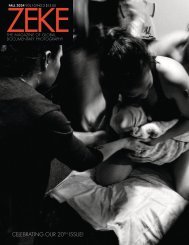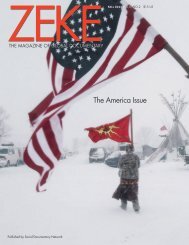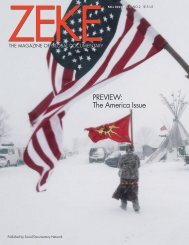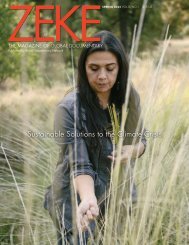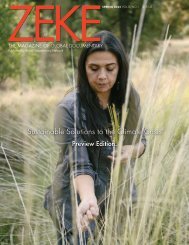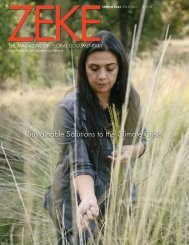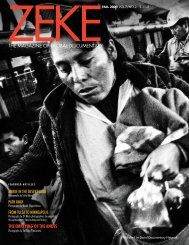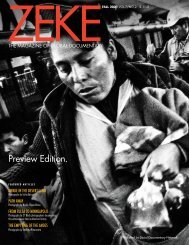ZEKE Magazine: Fall 2021, Interview with Joseph Rodriguez
Joseph Rodriguez is a New York-based photographer whose career spans over 25 years. His work has been published in National Geographic, The New York Times Magazine, Mother Jones, Newsweek, New York Magazine and others. He teaches at NYU and the International Center for Photography (ICP), among others, and has published several books including, more recently: Taxi: A Journey Through My Window 1977-1987 and LAPD 1994. Below is an excerpt from our conversation, edited for clarity.
Joseph Rodriguez is a New York-based photographer whose career spans over 25 years. His work has been published in National Geographic, The New York Times Magazine, Mother Jones, Newsweek, New York Magazine and others. He teaches at NYU and the International Center for Photography (ICP), among others, and has published several books including, more recently: Taxi: A Journey Through My Window 1977-1987 and LAPD 1994. Below is an excerpt from our conversation, edited for clarity.
You also want an ePaper? Increase the reach of your titles
YUMPU automatically turns print PDFs into web optimized ePapers that Google loves.
A COMPELLING AMERICAN SOCIOLOGICAL<br />
COMMENTARY BY KEITH FLYNN & CHARTER WEEKS<br />
Both the Great Recession that began<br />
in 2008 and the more recent global<br />
pandemic provide the backdrop<br />
for these remarkable portraits and<br />
testimonies of the people who do<br />
their best to survive <strong>with</strong> the odds<br />
stacked against them.<br />
- Glenn Ruga<br />
Social Documentary Network<br />
Featuring Photographs<br />
by Charter Weeks and<br />
Text by Keith Flynn<br />
Pre-Order your Copy Now<br />
https://tinyurl.com/RedhawkProsperityGospel<br />
<strong>Joseph</strong> <strong>Rodriguez</strong><br />
Continued from page 53.<br />
CC: With regard to the ongoing conversation<br />
about minorities and underrepresented<br />
communities reclaiming ownership<br />
of the narrative in the media, what do<br />
you think is the value of having someone<br />
from inside a community documenting<br />
it, as opposed to someone from outside?<br />
How do you see social media affecting<br />
the process?<br />
JR: I remember people used to tell me:<br />
“You’re not gonna make any money<br />
shooting Black and brown people.” That<br />
was racist. I had to let it roll off my back<br />
and say, “Okay, we’ll get there.”<br />
When National Geographic published<br />
“Growing up in East Harlem” in May<br />
1990, it was a cover story, World Press<br />
Photo-winning, all these awards, 26<br />
pages. It was the proudest day of my life<br />
when it was published: I was in Spanish<br />
Harlem at the library <strong>with</strong> my magazine,<br />
and these little chavelitos (young kids)<br />
were reading it being like “Wow! This is<br />
my neighborhood!”<br />
Some time later, several of the editors<br />
at the magazine told me they felt they<br />
should not be doing stories about poverty<br />
in America. And I said to myself: “Wait<br />
a minute, you mean to tell me I can go to<br />
Ethiopia and show bare breasted, starving<br />
women and that’s okay?” After doing<br />
another story in Africa I chose not to<br />
work for them. All of a sudden, 10 years<br />
ago they’re going back and looking at<br />
many of their stories through a colonialist<br />
lens, 'cause now it’s the 21st century<br />
and everybody calls you up on social<br />
networks.<br />
Social media has given many people<br />
a voice. I put a lot of my work there<br />
because the younger generations don’t<br />
read, they don’t go to libraries or look at<br />
books. Social media is giving a platform<br />
for many of us to see and read.<br />
There’s one thing I want to make clear<br />
though: just because I’m Latino, I’m a<br />
photographer who happens to be Latino,<br />
I’m not a Latino photographer. That’s not<br />
how I label myself.<br />
Ethnicity should not have to do <strong>with</strong><br />
what you represent — although that’s<br />
shifted, and there’s a lot of Black folks out<br />
there that are pushing the Black narrative,<br />
a lot of Latinos pushing the Latino narrative,<br />
a lot of women pushing the women<br />
narrative, a lot of trans folks pushing the<br />
trans narrative. Everybody’s out there trying<br />
to do something, and that’s okay. But<br />
it’s very easy to get pigeonholed like in my<br />
case: “Hire Joe, he’ll shoot AIDS. He’ll do<br />
drug addicts, dope fiends and gangsters.”<br />
I don’t look at what color or gender<br />
you are. I don’t care where you come<br />
from, what your class status is. If you’re<br />
putting the time in, if you’re willing to<br />
listen, you can do good work. I don’t like<br />
the way the conversations are going right<br />
now where, “Oh, you’re white, you’re<br />
not allowed to do this project,” or “You’re<br />
Black, you’re not allowed to do that<br />
project.” Photography has always been<br />
universal, as far as I’m concerned.<br />
4 / <strong>ZEKE</strong> FALL <strong>2021</strong>



